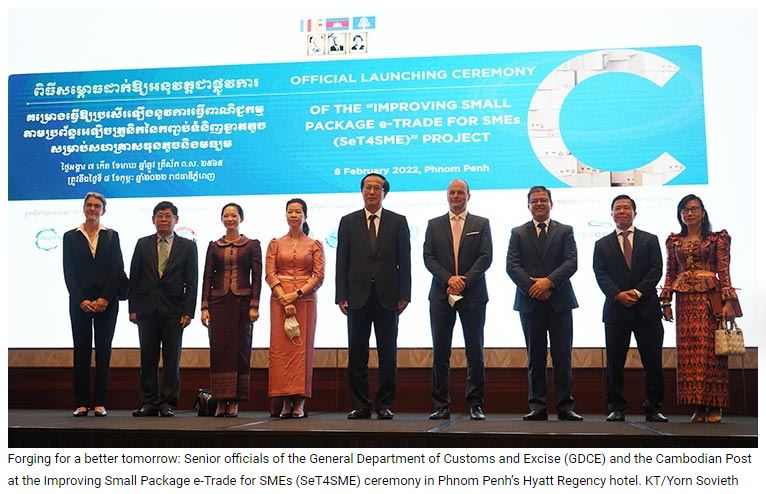Cambodia: Public-private partnership to digitally upgrade cross-border trade facilities
Mutual development of e-commerce and cross-border trading processes are themes consistent in both the Royal Government of Cambodia’s Rectangular Strategy and the World Trade Organization’s Trade Facilitation Agreement.
Competent infrastructure in this area is crucial to the Kingdom’s continued economic ascent, with SME demand for imports and exports growing rapidly en masse. Speed and user convenience are not the only efficiencies that will meet this demand however, cross-border compliance under the unifying WTO regulations is also key to ensuring fluent and timely delivery of packages to and from overseas partners.
Yesterday, at the Improving Small Package e-Trade for SMEs (SeT4SME) ceremony held in Phnom Penh’s Hyatt Regency hotel, the Global Alliance for Trade Facilitation (GATF) officially launched its initiative to digitally link systems between the General Department of Customs and Excise (GDCE) and the Cambodian Post.
The primary feature of this link is to facilitate and provide Electronic Advanced Data (EAD), so that customs and security information of the postal shipments can be received by customs ahead of arrival, making clearance and processing of imports and exports much more efficient. Phillipe Isler, Director of the GATF based at the World Economic Forum said:
“We have one word to describe this project – digitalisation – it is the lifeblood of e-commerce. The new digital connection platform that will link the respective electronic systems between GDEC and Cambodian Post for processing clearance of small packages is a key component.”
He added, “Our colleagues at UNCTAD and UPU will ensure the technical aspects of this project are delivered, however, technical delivery alone is not enough. One needs to ensure the users are sensitised and trained appropriately and that new processes are clear and concise. Only then will small businesses, many of them women-led, be able to unlock the true potential of e-commerce and online trading.”
The GATF promotes public and private sector partnership through mutual collaboration in the planning and financing of projects that accelerate economic development and integrity. The SeT4SME project has the Royal Government’s full support, which was evidenced by the attendance of Minister Pan Sorasak of the Ministry of Commerce.
“Completion of this project will further progress Cambodia’s commitment in trade participation through the digitisation of trade-related processes. These improvements will contribute to opening cross-border e-commerce possibilities, particularly for small and medium enterprises.
By delivering on these commitments, we can diversify and leverage opportunities in new growth sectors, especially emerging digital sectors.
This project comes at a time when cross border trade is needed more than ever before, particularly in times when the pandemic has accelerated the uptrend shift towards e-commerce. Some SMEs have suffered as a result, and they need to be supported in developing their business processes.”
Minister Pan Sorasak was keen to praise the efforts of Swisscontact which had been collaborating with the GDCE for several years, and are responsible to providing the digital interface between Cambodia Post and the GDCE’s current systems.
In addition to this implementation, Swisscontact will also develop an e-Trade portal that effectively acts as a one-stop shop for international traders who hope to scale their business reach and compliance across the ASEAN network. Sok Kha, Project Manager at Swisscontact and early advocate of EAD innovation explained to Khmer Times how their technologies worked.
“Our technology acts as a layer between the existing ASYCUDAWorld (GDCE) and CDS (Cambodia Post) systems, enabling the advanced relay of product and risk information which will allow clearance of small packages before they arrive.
At the moment, everything is done manually which can result in the hold up of small packages and in many other cases their rejection. Think about the processing complications of customs processing chemicals or combustibles without having any prior knowledge of their arrival.”
This initiative is projected to take roughly two years and is expected to be fully implemented by mid of 2023.
Source: https://www.khmertimeskh.com/501021538/public-private-partnership-to-digitally-upgrade-cross-border-trade-facilities/


 English
English




